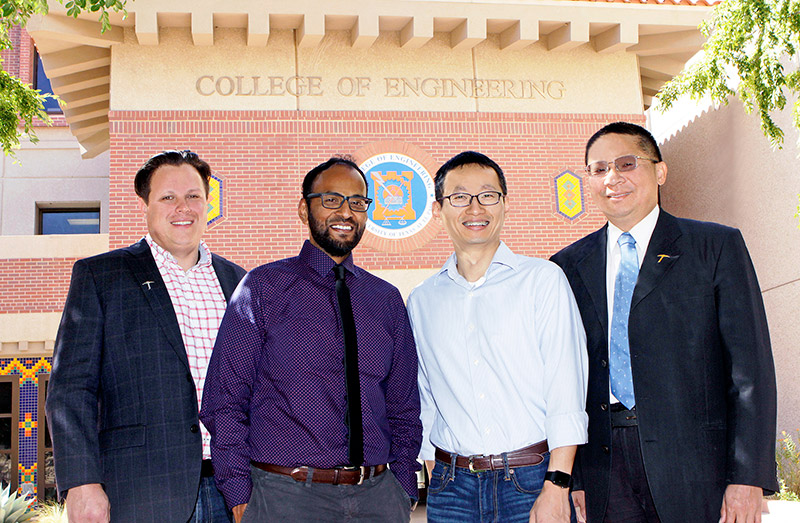UTEP, Drexel University Plan Online Collaboration to Increase Minority, Women Graduates in Green STEM Fields
Last Updated on October 16, 2018 at 12:00 AM
Originally published October 16, 2018
By UC Staff
UTEP Communications
The University of Texas at El Paso is collaborating with Drexel University to increase the number of graduates - particularly minorities and women - who enter green STEM fields through the development of cyber-enabled courses and mentoring between the campuses.

The effort is being funded by a $900,000 grant from the U.S. Department of Education’s Minority Science and Engineering Improvement Program (MSEIP).
The partnership is geared toward providing minority students, specifically Hispanics, with a path forward for enrolling and completing undergraduate degrees and certificate programs focused on mastering skills in industrial and manufacturing engineering, systems engineering, and green engineering. At UTEP, the College of Engineering will establish a Minority INnovation Engineering Research for Student Success (MINERSS) Center. The MINERSS Center will create a hub for project-based learning experiences and online communication for problem solving across institutions.
“To educate students in emerging green STEM fields, this project will help reduce the gap between demand and supply of qualified technologists specializing in renewable energy,” said Bill Tseng, Ph.D., professor and chair of UTEP’s Department of Industrial, Manufacturing and Systems Engineering and the grant’s principal investigator (PI). “The unique focus of this project is on technologies for green materials, green manufacturing and renewable energy and their innovative delivery approach that integrates experiential and research-based learning for undergraduates and graduates through the use of virtual labs tied to actual hardware and current research facilities. The current project with the help of the proposed MINERSS Center will bring together students from UTEP and create a hub for project-based learning experiences and online communication across the collaborating partners.”
The envisioned MINERSS Center will be composed of three primary facilities:
- Incubation Studio: An interactive space for students to explore various ideas. The studio will offer multiple resources for students to explore green and systems engineering-related concepts and ideas.
- Virtual Reality Studio: Will be used to introduce students to social and team-based learning and virtual world implementation experiences.
- Educational Fabrication Studio: Will be outfitted with various desktop 3D-printing facilities so students can see their ideas and projects furthering experiential and real-world learning through practice.
“The current project looks to better understand and address fundamental yet challenging problems in engineering education among minorities, including pre-college experience factors, sociocultural factors, institutional factors, and college experience factors,” said Satya Aditya Akundi, Ph.D., research assistant professor of industrial, manufacturing and systems engineering and one of the grant’s three co-PIs. “These factors have all been shown to impact both retention and selection of engineering in college, especially for minorities. To accomplish this, we will work closely with El Paso high schools to recruit participants and disseminate information from the project. We are excited about establishing a MINERSS Center at UTEP which will provide several online modules incorporating cyber infrastructure, developing online virtual student learning communities. This will help in improved curriculum reform and enhanced Hispanic student experience in engineering-based academia.”
In addition to the proposed MINERSS Center, the Department of Industrial Manufacturing and Systems Engineering in UTEP’s College of Engineering will be bolstered through the incorporation of state-of-the-art, internet-based and virtual reality technologies.
“STEM learning through the new paradigm of online class — cyber 3-D interaction and experience — will attract great attention from students and encourage collaborative work through interdisciplinary research,” said Yirong Lin, Ph.D., associate professor of mechanical engineering and grant co-PI. “This project will provide incentives and scholarships to students, thereby enabling them to meet the combined institutional goal of stewardship toward student commitment and success. This project will also help create green technology-oriented training and curricula for the future workforce in meeting the change in industry toward green energy and green technology.”
Furthermore, the project will reinforce ongoing initiatives to prepare students for industry through green energy education. UTEP will work closely with various on-campus programs to mentor, advise and encourage National Merit Scholarship Program students, minorities and women to pursue academic majors and careers. The collaborative effort in developing cyber-based engineering curriculum between UTEP and Drexel will broaden the impact to a national level.
“The experiences gained through this project will greatly enhance student interest to enroll, persist, pursue and complete STEM-based engineering undergraduate degrees,” said Norman D. Love, Ph.D., associate professor of mechanical engineering and grant co-PI. “The project will result in improved curriculum reform and enhanced Hispanic student experiences in STEM-based academia. We will be able to increase the number of Hispanic, well-trained STEM workforce to meet the emerging job trends, especially minority engineers, and enhance the quality of the educational experience currently provided in the Southwest border region of the United States.”